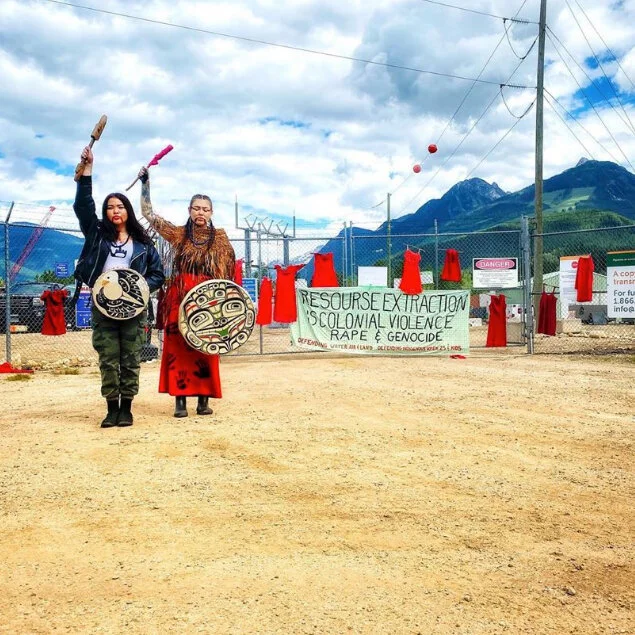Carol speaks to the importance of places like Cumberland Island, some of the most pressing threats Cumberland currently faces, and the dangerous precedent that will be set if we continue to allow private-interest to chip away and fragment the very little bit of wilderness that is currently protected.
Read MoreWe explore climate colonialism, reparations, carbon removal, and a real “just transition” with guest Olúfẹ́mi O. Táíwò. Our conversation reminds us that while climate colonialism is unfurling before us, there is a myriad of tangible ways countries and movements across the so-called global North could begin making reparations.
Read MoreCalled "the queen of canopy research," Nalini Nadkarni explores the rich, vital world found in the tops of trees. We journey into the canopies with Nalini to learn about the spectacular biota of the canopy.
Read MoreHow do we navigate the settler desire to own land? Severine shares the messiness and opportunity of living amongst the prosperity of extraction in the spaces we inhabit while dedicating ourselves to a land-based livelihood that awakens the call to live inside of accountability to people and place.
Read MoreCamille shares the role of mother trees in forest regeneration, how mycorrhizal networks are faring, and the ramifications of large scale reforestation and afforestation efforts when they are not implemented thoughtfully and locally. We also talk about disturbances to forest ecosystems, the role of mycorrhizal networks, and the unbelievable importance of peatlands.
Read MoreDr. Vandana Shiva joins us to discuss how we are being set up to become accessories to the digital world and how we can reclaim our intellectual freedom and sovereignty from the hands of digital dictatorship– a powerful reminder that we are meant to live beautiful lives as sovereign beings, not as digital appendages.
Read MoreHarsha shares why it is imperative to rid the concept of legal/illegal personhood in movements for the climate and environment. Harsha leads us in the deeply regenerative work of political imagination as we think about what our communities and livelihoods look like without imposed borders.
Read MoreDr. Ramsey gives us an in-depth explanation as to what parasitic mites like Varroa destructor and Tropilaelaps mean for bee health, how climate change impacts the nutritional quality of pollen, and how human design and development has strengthened and spread parasitic mites to the disadvantage of bees globally.
Read MoreIn this powerful conversation with land defender Sii-am Hamilton, we are invited to discuss futuristic ways forward in recognition that Indigenous communities have been practicing creative resistance against colonialism and capitalism for hundreds of years.
Read MoreCorrina reminds us that Ohlone territory still holds tremendous abundance and that the land can sustain us in a way that would provide for our wellbeing should we choose to really re-examine what it is we need to survive. We explore responsibility and reciprocity on stolen homelands by asking what it means to be in right relationship.
Read MoreAs we find ourselves alive in this time of great turning, where feelings of grief, despair, and gloom are omnipresent, we seek counsel from Joanna on finding emotional courage, building allyship, and practicing gratitude for all which moves us. Joanna offers her wisdom for remaining sane and grounded as life-long activists in the uphill battle of ecological crisis.
Read MoreIn conversation with Astra, we explore the messy and difficult endeavor that is democracy, why voter suppression has become so rampant, the anti-democratic nature of debt, and how we can create more democratic spaces in our everyday lives.
Read MoreDeb, Vanessa, and Rachael share about the 2019 fires, the role of Indigenous women in cultural burning, the relationship between kin and fire, and how the intensity and scale of these bushfires need to be situated in context to the Australian government’s continued aggressive expansion of fossil fuels and coal mining.
Read MoreNatasha discusses the necessity of finding non-human guides, the responsibility we have to make room for plants, anthropomorphism, restoration ecology, and reconfiguring our relationship to the future.
Read MoreCaldicott draws our attention to the realities of nuclear power reactors, proliferation and weapons, as well as the ways in which nuclearism has already wrought an unimaginable amount of havoc and trauma on our environment, culture and bodies.
Read MoreExplore what catalyzed Francis’ unwavering commitment and the profound impact of grappling with personal responsibility, as well as evergreen topics like Earth stewardship, the pleasure of listening and walking as pilgrimage and rite of passage.
Read MoreShannon discusses the cycle of abuse within the Thai fishing trade alongside the larger systemic issues that drive such exploitation and reflects on the making of her film, Ghost Fleet, which exposes the dark side of illegal and unregulated fishing through the harrowing testimony of survivors.
Read MoreRebecca begs the question; if much of our clothing originates from the soil, why don’t we interrogate the fashion industry the way we do the agricultural industry? In order to answer this question, we begin by exploring the rise of industrialized fashion and its global impact – when did we start to rampantly consume clothing?
Read MoreStephen Jenkinson shares wisdom on the cycle of life and elderhood and offers so much that makes the ancient in us sit up and listen. As fluidly as water, Jenkinson uses language to disrupt clinging and confusion as we discuss the loss of elderhood.
Read MoreDr. Stafford has spent years listening to the sounds of climate change in the Arctic and learning how anthropogenic sounds, like ship propellers and oil and gas exploration, are changing marine mammals’ capacity to communicate.
Read More


















![STEPHEN JENKINSON on Closing Time [ENCORE] /199](https://images.squarespace-cdn.com/content/v1/5403e5dbe4b04db10d1d362b/1590295181313-44XE3UTXOQ8LVZ6Y7M4H/186_StephenJenkinson_ForTheWild_Image.jpg)
